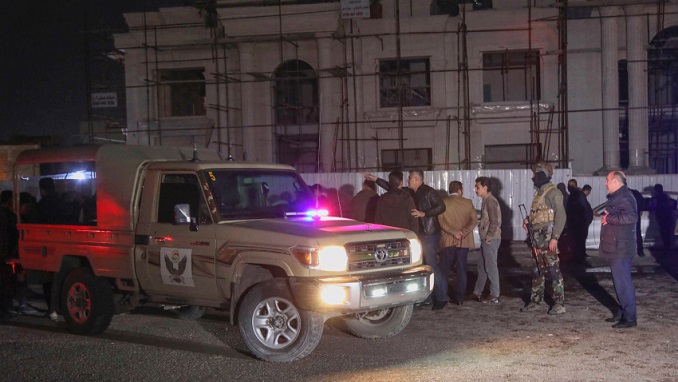Rockets struck outside an airport near where U.S. forces are based in northern Iraq late Monday, killing one U.S.-led coalition contractor and wounding at least eight other people, Iraqi security and coalition officials said, sparking fears of new hostilities, Associated Press reports.
At least three rockets hit areas between the civilian Irbil international airport in the semi-autonomous Kurdish-run region and the nearby base hosting U.S. troops at 9:30 p.m. No one immediately claimed responsibility.
One civilian contractor with the coalition was killed and five others wounded, coalition spokesman U.S. Army Col. Wayne Marotto said. One U.S. service member was wounded, he said. He did not reveal the nationality of the dead contractor and said this was under investigation.
At least two civilians were also wounded and the rockets damaged cars and other property, security officials said, without providing more details. Attacks targeting Irbil airport are rare, with Monday’s rockets the first to strike the area in five months.
The contractor with the U.S.-led coalition who was killed after a barrage of rockets struck near an airport in northern Iraq was not an American national, a coalition spokesman said Tuesday, hours after the attack sparked fears of renewed hostilities in the region. A statement from Kurdistan’s Interior Ministry said “several people” had been injured based on a preliminary investigation.
The rockets were launched from an area south of Irbil near the border with Kirkuk province and fell on some residential areas close to the airport. The officials spoke on condition of anonymity in line with regulations.
Iraqi President Barham Saleh condemned the attack, saying in a statement posted online that it marked a “dangerous escalation.” Kurdish authorities cautioned Irbil residents to stay away from targeted areas and remain in their homes.
In a later statement, a little-known Shiite militant group calling itself Saraya Awliya al-Dam, Arabic for the Guardians of Blood Brigade claimed responsibility for the attack. It claimed firing 24 rockets that avoided the airport’s defenses, specifically naming an automatic machine gun known as a C-RAM that protects American installations in Iraq.
“The American occupation will not be safe from our strikes in any inch of the homeland, even in Kurdistan, where we promise we will carry out other qualitative operations,” the claim said, according to the SITE Intelligence Group.
About a dozen such groups have cropped up in the past year claiming rocket attacks, but US and Iraqi security officials say they are front groups for prominent pro-Iran factions including Kataib Hezbollah and Asaib Ahl al-Haq.
U.S. Secretary of State Antony Blinken said the U.S. was pledging its support for investigating the attack and holding accountable those who were responsible.
“We express our condolences to the loved ones of the civilian contractor killed in this attack, and to the innocent Iraqi people and their families who are suffering these ruthless acts of violence,” he said in a statement.
The attacks drew condemnation from senior Iraqi, U.S. and other Western officials. The United States reacted angrily to the base assault outside the international airport in Erbil, capital of Iraq’s semi-autonomous Kurdish region.
“We are outraged by today’s rocket attack,” Secretary of State Anthony Blinken said in a statement, vowing to “hold accountable those responsible”. “Initial reports indicate that the attacks killed one civilian contractor and injured several members of the Coalition, including one American service member and several American contractors,” he said.
U.N. Special Representative Jeanine Hennis-Plasschaert deplored the deadly assault and called for national unity.
“Such heinous, reckless acts pose grave threats to stability. Iraq must be shielded from (external) rivalries,” she said in comments posted on Twitter. “We call for restraint and for close Baghdad-Erbil collaboration to bring culprits to justice.”
Iraqi President Barham Saleh tweeted the attack marked a “dangerous escalation and a criminal terrorist act”.
Masrour Barzani, prime minister of the autonomous Kurdish region, condemned the assault “in the strongest terms”. Barzani said he had spoken to Iraqi Prime Minister Mustafa al-Kadhimi “on ways to cooperate and identify the outlaws behind this terror attack”.
“I condemn in the strongest terms tonight’s rocket attacks on Erbil. I urge all Kurdistanis to remain calm,” he tweeted.
